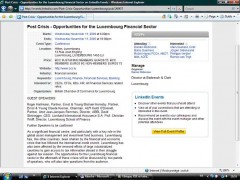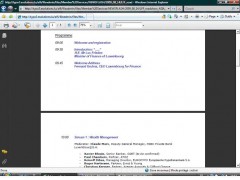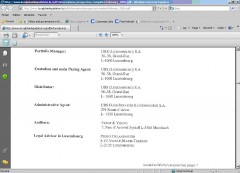11/23/2009
The frontage of business standing
PwC has just published its Economic Crime Survey.
There are no respondants from Luxembourg as officially economic crime does not exist, so corruption does not exist in this jurisdiction.
Why ?
Thanks to the small size of the country, the fact that everyone knows everyone else (thus encouraging self-regulation) and the high level of incomes.
This is what was said by the Luxembourg authorities in OECD and GRECO reports.
This may be the reason why there are no data about corruption in Luxembourg.
In its report to assess the enforcement of the OECD Bribery Convention, TI observes that “No TI reports were prepared for three countries, Estonia, Iceland and Luxembourg, since TI lacks experts in those countries, but TI Estonia provided current data on cases and investigations”.
It appears that in the tables data are actually missing only for two jurisdictions: Iceland, the jurisdiction that went bankrupt, and Luxembourg. Among the EU Member States that signed the OECD convention (most States) Luxembourg distinguishes itself, as it is the only jurisdiction that is unable to provide data, which is telling for a jurisdiction that is an important financial center despite it is a tiny state
The fontage is definitely cracked.
Several civil servants from the tax admuinistration are before the court in Luxembourg this week
Corruption, economic crime and tax evasion with offshore scams are on the agenda.
The tax haven is there.
19:12 Posted in Luxembourg | Permalink | Comments (0)
11/22/2009
A disastrous communication in Luxembourg that harms the sustainability of the jurisdiction
A couple of months ago, after the release of Rainer Falk's report and prior to its censorship under pressure including threats on the financing of Luxembourg NGOs ABBL stated that "Luxembourg does not exploit poor countries" : ABBL said that "The study insinuates that the Luxembourg financial centre features tax practices and mechanisms that would set it apart as a tax haven and implicitly accuses Luxembourg legal vehicles - notably investment funds - of being used to make the poorest countries even poorer."
This press release was typical wooden language (like in the Madoff affair in another domain): denying the facts and not telling the truth. Any student in crisis communication knows it is no use denying and not telling the truth.
I am afraid professionals and the regulator in this jurisdiction are actually unable to make amend.
This week, the press reported that a magistrate in Switzerland sentenced Abba Abacha, General Sani Abacha's son, to a suspended jail term, and ordered the confiscation of his assets of $350m. "The money is held by his criminal organization and seized through international assistance in Luxembourg and the Bahamas" Geneva canton's justice office said in a statement.
A couple of weeks ago Luxembourg NGOs met the bankers
And as I thought, representatives of the financial sector
- did not make amend and admit tax evasion from poor countries (that did not sign agreement for exchange of tax information) exist and is not fair business for the growth of the center
- did not accept to criminalize tax evasion like money laundering
- did not accept to reinforce sanctions for those who do not abide by the rules
- did not accept to put an end to the influence of professionals on the Luxembourg Regulator.
- ...
They were definitely arrogant and of bad faith.
Jean-Jacques Rommes, Director ABBL, stated that the NGOs suffer from the Stockholm syndrome, which would mean the NGO's are kidnapped by the criminal poor populations of the 3rd world that they want to serve and they start thinking like the poor.....
This argument is not relevant! It can be reversed immediately and credibly against the financial center. The Luxembourg banking world is captive of dirty money and illegitimate practices and suffers from a Stockholm syndrome. They think like the fraudsters and evaders and the cheaters that hold them captive with their money.
Above all, when Jean-Jacques Rommes states that "to open the doors one should not start by a slam", I am afraid he forgets that it is Luxembourg that slammed the door in the first place:
I proposed by mid 2000 a project about business ethics and corporate social responsibility. Nobody supports this proactive initiative: neither the public research (I proposed a detailed project that anticipated what happened this year) nor the private sector (big four firms and banks). They actually slammed the door.
I proposed several times in 2007-2008 to Fernand Grulms, CEO of Luxembourg For Finance, my project for a paradigm shift including in September last year the organisation of a conference about "Ethique, RSE et lutte contre la corruption dans le monde contemporain : Luxembourg face à son destin" (free translation: ethics, CSR and the fight against corruption: Luxembourg facing its destiny). He never answered and therefore slammed the door. By the way he is the one who was so agressive with NGOs by calling for financial threats.
I proposed, publicly this year in the Wort in an open letter, to Jean Meyer, Chairman ABBL, once more the paradigm shift. He answered by slamming the door and denying issues especially tax issues and questions raised by the Madoff affair: as opposed to what he said the European Commission confirmed that the automatic exchange of tax information is the objective of the UCITS directive ("The Directive envisages that all EU Member States will eventually move to automatic information exchange") and however Luxembourg is not implementing correctly the UCITS directive;
In a nutshell, even benevolent advice, such as the one I gave on this blog or articles, seems to be not at all welcome "free" contributions. (Cf. what I said in the Financial Times last January)
While they go on ignoring clear-sighted advice, they have been building for two years their deceptive so-called ethics "made in Luxembourg" that however lacks credibility:
1. IMS
To reject Rainer Falk's study, they communicate that they support poor countries with generous grants. As I explained two years ago when IMS Luxembourg was launched, Corporate Social Responsibility in Luxembourg is limited to prestige operations that are much more an opportunity to promote the brand than an enforcement of actual ethics in business practices with specific CSR issues in the financial sector as defined by ORSE (the areas of interest are: patronage, companies and territories, management of diversity and societal innovation). Since 2007 they organized a couple of events.
2. LIGFI
LIGFI was launched last May. The domain ligfi.org was actually reserved in December last year by a professional from a firm whose activity is economic intelligence. As I said, There are many red flags that it is actually an economic intelligence operation born by both Luxembourg professionals in or close to the financial sector and the government of Luxembourg:
Most LIGFI founders are Luxembourg people, live and work in Luxembourg, in or close to the financial sector. Academe were not involved in the project team except Gilbert McNeill who seems to bear alone the project. He is the contact person for General Information, Press and Membership.
The Board of Directors and Executive Committee include neither pure Academe nor NGOs that therefore do not participate to the definition of the policy of the institute.
This may explain the reason why in a recent press release LIGFI only explicitly calls for banks, other financial services and service providers to the financial sector to join the association.
However should academe and NGOs join they would have ridiculous voting rights whereas those who have the money (financial institutions) have the most rights.
Critics and those who are not right-minded are excluded or will be excluded and lose their money
LIGFI ignores powerhouses like GFI or TJN in the debate on financial integrity
The first speaker at the LIGFI Monthly Finance Lunch will be this Wednesday Luc Frieden: the best evidence that LIGFI is a Luxembourg political tool. There are critical issues for the reputation of Luxembourg, and especially Madoff and the implementation of agreements to exchange tax information. In both cases Luc Frieden was disappointing because of the business view on ethics and the decision-making power:
On the one hand his draft law to enforce double taxation agreements opens the condition for a drift with a dubious "discharging fine",
And on the other hand the way the Madoff affair is handled since its beginning under the supervision of his Ministry is a disaster for the reputation of the jurisdiction:
Claude Kremer, Chairman ALFI, is no longer talking of "faithful transposition" of the directive like Luc Friden but of a "transposition as it was needed", which complies with the influence of professionals on the regulator that is in my opinion the key problem.
Luc Frieden suggested arbitration. "An international arbitration will be a more professional and fast solution that is probably more satisfactory to all (...) I prefer an arbitration of two, three years than having 100 court cases decided in 10 years", he said. Does that mean that the "strong relationships with regulatory authorities, the government and the legislative body" that "enable ALFI [it is true as well for ABBL] to make an effective contribution to decision-making through relevant input for changes to the regulatory framework, implementation of European directives" (wording of the ALFI brochure: "Your bridge between Europe and China: Luxembourg", October 2009) created the conditions for a justice denied. This is the reason why is so complicated to enforce a criminal liability for legal persons that would have been very useful in the Madoff affair as CSSF seems to state in its latest press release that the bank provide inaccurate information in the framework of the authorization process. A criminal procedure against the legal person is not possible and I cannot imagine either a criminal procedure against the individuals that created Luxalpha as they are supported by the business community and the government despite what CSSF states now that was however known since the beginning of the Madoff affair. E.g. :
- Conference: Post Crisis - Opportunities for the Luxembourg Financial Sector (11 November 2009)
Guest speakers: Roger Hartmann, Partner, Ernst & Young and former Managing Director for UBS and Luxalpha ; Michael Hornsby, Partner, Ernst & Young ; Claude Kremer, Chairman, ALFI ; Keith O'Donnell, Partner, Atoz ; Jean-Jacques Rommes, Director, ABBL ; David Steinegger, CEO, Lombard International Assurance S.A. ; Prof. Christian Wolff, Director, Luxembourg School of Finance
- Luxembourg For Finance Roadshow to Hong Kong, Singapore and Bejing (20 to 26 October 2009)
Speakers: Luc Frieden, Minister of Finance of Luxembourg ; Fernand Grulms, CEO Luxembourg For Finance ; Roger Hartmann, Partner, Ernst & Young and former Managing Director for UBS and Luxalpha ; Clude Kremer, Chairman ALFI...
Jean Guill, Managing Director CSSF , who is said to be close to Luc Frieden, communicates in a very bad way as the regulator does not state the accurate situation. In its last press release, CSSF states that, "The documents submitted to the CSSF in the framework of the authorisation procedure for each of the three Sicav,1 on the basis of which they were registered on the official list of UCIs, included no reference neither to the identity of BMIS nor, more importantly, to the multiplicity of functions carried on de facto by one entity". "One entity" does not refer to BMIS otherwise CSSF would have said "This entity". It refers to the bank, and it is clearly stated in the prospectus that the bank carried on de jure multiplicity of functions, and especially management company and depositary, which is clearly prohibited by the directive but not prohibited by the Luxembourg law of transposition that transposed so-called faithfully the UCITS directive.
We can conclude that CSSF did not read seriously the documents submitted in the framework of the authorisation procedure as it is hostage of professionals that have a close and direct say and participate to the drawing up of the regulation.
I am afraid the Luxembourg regulator is not doing a correct job of regulator in Luxembourg and does not make amend contrary to SEC that is willing to tighten up the ship (Cf. recent SEC report: Program Improvements Needed Within the SEC's Division of Enforcement).
Such introspection on the regulation is only impossible in Luxembourg.
Go on like that guys in Luxembourg, and in a couple of years your financial center will go bust and it will be YOUR responsibility.
02:43 Posted in Luxembourg | Permalink | Comments (0)
11/19/2009
CSSF communicates on Madoff
The Luxembourg regulator yesterday communicated on the Madoff affair once more in a very bad way.
Nothing about the influence of professionals that opened the drift.
But inaccurate statements at the end:
Finally, as regards the three Luxembourg investment companies affected by the Madoff case and currently in judicial liquidation (the "Sicav", cf. CSSF press releases of 15 April 2009 and of 13 May 2009), the CSSF wishes to recall and specify the following points:
- During an authorisation process, the CSSF approves a UCI's incorporation documents, i.e.: the prospectus and the articles of incorporation or the management regulations of the UCI in question. In accordance with the law of 20 December 2002 relating to undertakings for collective investment, a UCI's prospectus has to contain all the necessary information for an investor to reach a properly informed decision on the proposed investment. Internal documents which merely govern the practical terms and conditions between professionals (such as operating memoranda) have to comply with the contents of the approved and published prospectus and cannot deviate therefrom. These internal documents are not submitted to the CSSF.
- The documents submitted to the CSSF in the framework of the authorisation procedure for each of the three Sicav,1 on the basis of which they were registered on the official list of UCIs, included no reference neither to the identity of BMIS nor, more importantly, to the multiplicity of functions carried on de facto by one entity. Between the launch of the various Sicav and the breakout of the Madoff affair in December 2008, the CSSF was never informed in a transparent manner, by the professionals involved, of the structure actually set in place nor of the role played in practice by BMIS at different levels of this structure.
Let's have a look on the original prospectus page 7:
Can CSSF seriously state it was not aware of the multiplicity of functions carried on de facto by one entity as it was not de facto but actually de jure?
Who was Portfolio Manager, Custodian and main Paying agent, Distributor ? The same entity located at the same address.
Once more stakeholders, and especially investors, are considered as idiots in this secrecy jurisdiction that is unable to make amend.
06:09 Posted in Luxembourg | Permalink | Comments (0)










